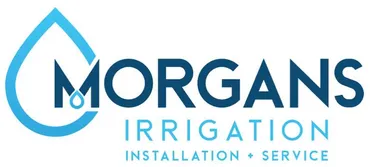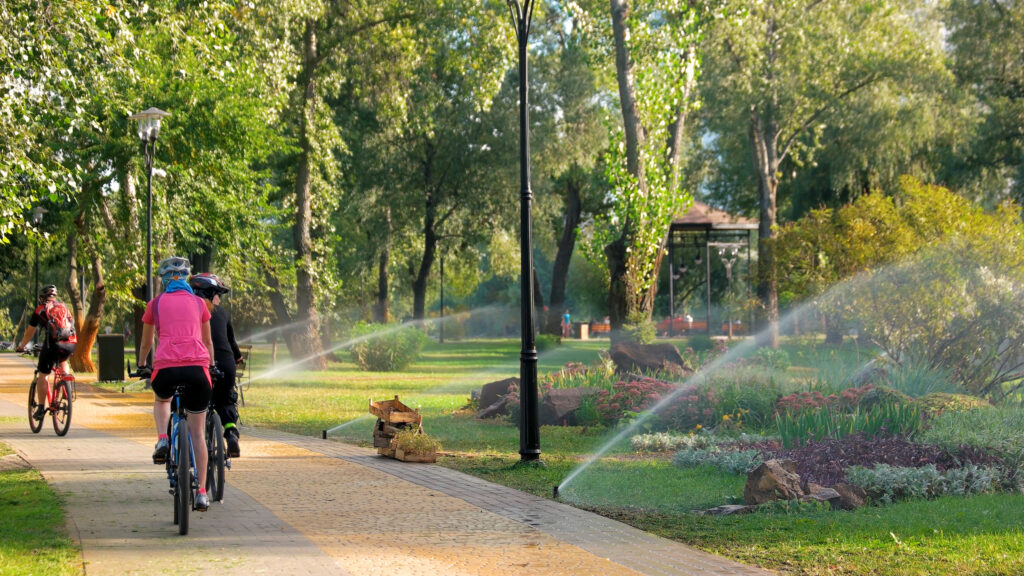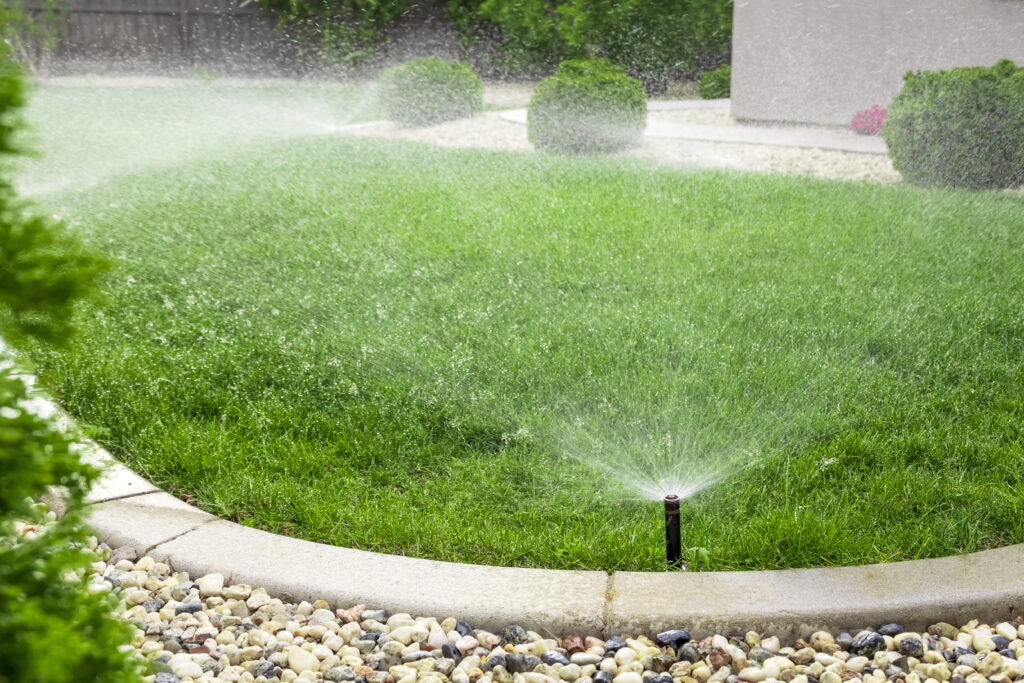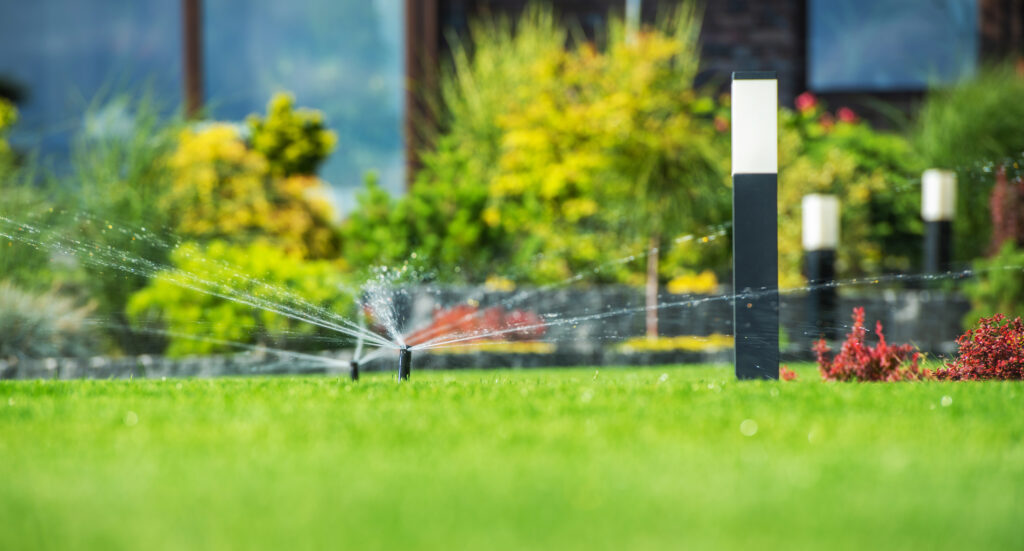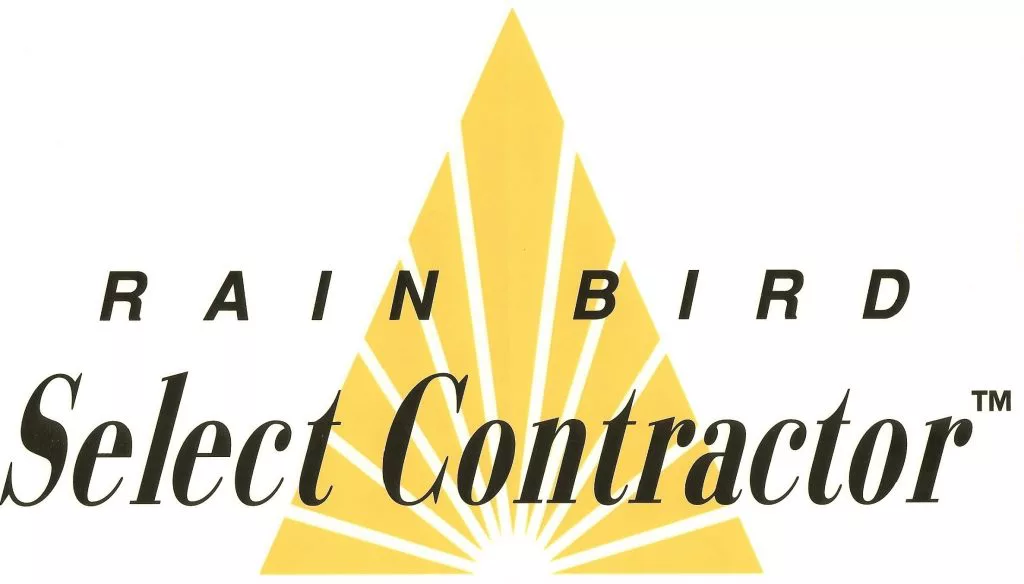Proper irrigation is important for maintaining a lush, green lawn. It ensures that grass receives the right amount of water, promoting deep root growth and overall plant health. Adequate watering helps lawns resist pests, weeds, and diseases, creating a more resilient and visually appealing landscape. There are, however, many common mistakes that homeowners make that are easy to correct. Understanding what these are and how to prevent them will go a long way toward keeping your lawn healthy.
Benefits of a Healthy Lawn
A healthy lawn enhances the aesthetic appeal of your home, increases property value, and provides a safe play area for children and pets. Additionally, well-maintained lawns improve air quality by producing oxygen and trapping dust and pollutants.
Common Mistakes in Lawn Irrigation
Overwatering
Overwatering can lead to waterlogged soil, causing grass blades to turn yellow or wilt. Puddles or runoff on the lawn surface are clear indicators of excessive watering. This promotes shallow root growth, making the lawn susceptible to drought and disease. It can also lead to fungal growth, creating an unhealthy environment for your grass.
Underwatering
Underwatered lawns often show signs of stress, such as brown or dry patches. The grass may become brittle and less resilient underfoot. Insufficient watering weakens the grass, reducing its ability to withstand heat. This can lead to increased vulnerability to pests and diseases.
Incorrect Timing
The optimal time to water your lawn is early in the morning, between 4 AM and 10 AM. This allows the grass to absorb water before the heat of the day causes evaporation. Watering during the heat of the day leads to significant water loss due to evaporation as well as scorching the leaves of the plants or grass. Evening watering can leave the lawn damp overnight, encouraging fungal growth.
Poor Irrigation System Maintenance
Regular maintenance of your irrigation system ensures efficient water usage and extends the system’s lifespan. It helps identify and fix issues like leaks, clogs, and broken sprinkler heads.
Clogged nozzles, misaligned sprinklers, and leaks are common problems that can waste water and lead to uneven irrigation. Regular inspections can help prevent these issues.
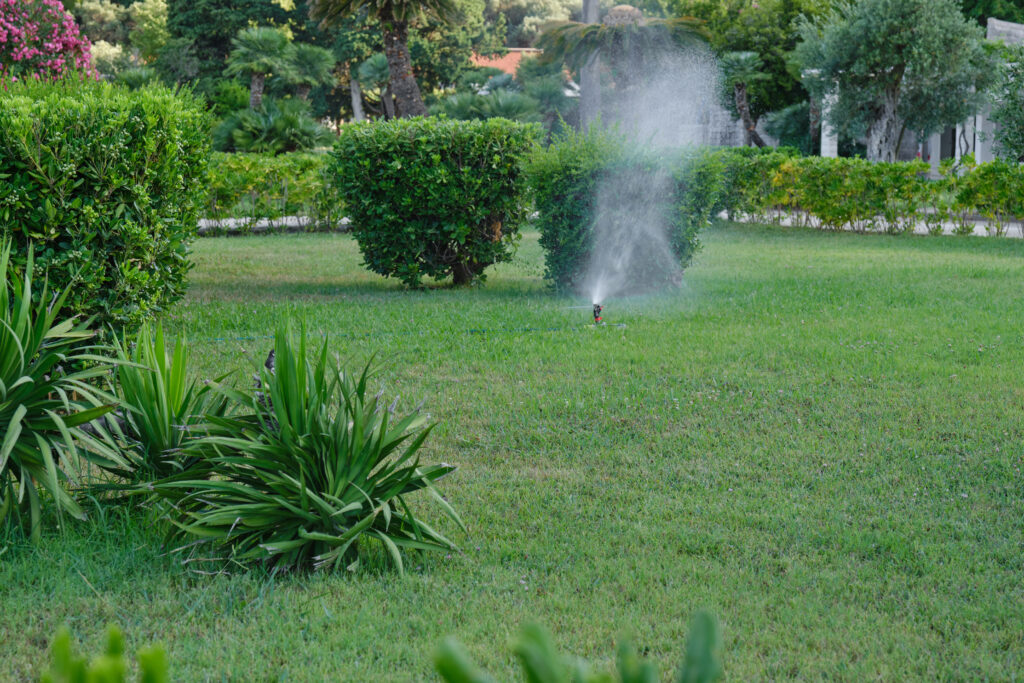
How to Avoid Irrigation Mistakes
Implement an Efficient Watering Schedule
Develop a watering schedule that addresses your lawn’s specific needs, including grass type, soil conditions, and local climate. Adjust the schedule as needed to account for seasonal changes and rainfall. Modify your watering schedule based on seasonal variations. For example, lawns require more water during hot, dry summers and less during cooler, wetter months.
Use Smart Irrigation
Smart irrigation systems use weather data and soil moisture sensors to optimize watering schedules, ensuring your lawn receives the right amount of water without waste. Devices like smart controllers, soil moisture sensors, and weather-based systems can help automate and improve the efficiency of your irrigation system.
Regular System Inspections
Inspect your irrigation system regularly for signs of wear and tear. Check for leaks, clogs, and misaligned sprinklers that can lead to uneven watering. Consider hiring professionals for thorough inspections and maintenance. They can identify and fix issues that may not be obvious, ensuring your system operates efficiently.
Tips for Maintaining a Healthy Lawn
Soil Health and Fertilization
Regular soil testing helps determine nutrient levels and pH balance. This information guides you in applying the right type and amount of fertilizer. Apply fertilizers based on soil test results to promote healthy grass growth. Avoid over-fertilization, which can harm the lawn and the environment.
Proper Mowing
Maintain the appropriate mowing height for your grass type to encourage deep root growth and reduce stress on the lawn. Mow regularly to keep your lawn healthy, but avoid cutting more than one-third of the grass blade at a time to prevent stress.
Aeration and Dethatching
Aeration involves perforating the soil with small holes to allow air, water, and nutrients to penetrate the grass roots. This helps improve soil structure and root development. Dethatching removes the layer of dead grass and organic matter that accumulates on the soil surface. This enhances water absorption and reduces the risk of disease.

Ensure Year-Round Healthy Lawn Irrigation
For the best in healthy lawn irrigation, trust Morgans Irrigation. With years of experience and a commitment to customer satisfaction, we provide expert irrigation services designed to keep your lawn lush and vibrant. We offer eco-friendly solutions and personalized care, ensuring your lawn receives the attention it needs. Our comprehensive services, including sprinkler installation, repair, and seasonal maintenance, are backed by a 100% satisfaction guarantee. Contact Morgans Irrigation today for a free estimate and experience the difference professional lawn care makes.
Healthy Lawn Irrigation FAQs
How often should I water my lawn to keep it healthy?
Water your lawn about 1 inch per week, adjusting for weather conditions and soil type. It’s best to water deeply and infrequently to encourage deep root growth.
What is the best time of day to water my lawn?
Water your lawn early in the morning, between 4 AM and 10 AM. This allows water to soak into the soil before the heat of the day causes evaporation and reduces the risk of fungal growth.
How can I tell if my lawn is overwatered?
Signs of overwatering include yellowing grass, waterlogged soil, and runoff. Overwatered lawns may also develop fungal growth and have a spongy feel underfoot.
What are the benefits of using smart irrigation systems?
Smart irrigation systems optimize water usage by using weather data and soil moisture sensors. They adjust watering schedules based on real-time conditions, preventing over and under-watering and promoting efficient water use.
How does aeration benefit my lawn?
Aeration improves soil structure by creating small holes that allow air, water, and nutrients to penetrate deeper into the soil. This process promotes healthy root growth, enhances water absorption, and reduces soil compaction, leading to a healthier, more resilient lawn.
